An AI certification can help you get ahead if you’re just joining the workforce. You can also use AI certifications to validate your skills and expertise to potential employers. AI certifications are also beneficial if you’re already working in the AI industry and looking to move up the career ladder. They can help you develop new skills and knowledge, stay up-to-date with the latest trends, and make you more marketable to employers.
But with so many AI certification courses available, it can be tough to know which one is right for you. Here are our picks for the top AI certifications to help you get ahead in your career:
- Microsoft Certified Azure AI Fundamentals: Best for AI concepts on Azure services (Read more)
- Learn with Google AI: Best for hands-on learning with Google’s AI tools (Read more)
- Artificial Intelligence A-Z: Learn How To Build An AI (Udemy): Best for a comprehensive, hands-on approach (Read more)
- Master the Fundamentals of AI and Machine Learning (LinkedIn Learning): Best for busy professionals (Read more)
- Artificial Intelligence: Business Strategies and Applications (UC Berkeley): Best for business integration (Read more)
- AI for Everyone (Coursera): Best for non-technical professionals (Read more)
- Introduction to TensorFlow for Artificial Intelligence, Machine Learning, and Deep Learning (Coursera): Best for TensorFlow mastery (Read more)
- IBM Applied AI Professional Certificate (Coursera): Best for a well-rounded AI education (Read more)
Best AI certification comparison
Below are eight of the best online and self-paced AI certifications you can take in 2023.
Many of these courses have no learning requirements and are intended to give IT experts and novices the basic understanding and practical abilities needed to address real-world AI issues. On the other hand, some are best suited for IT professionals with some AI and machine learning (ML) knowledge who wish to expand their expertise and stay up with the newest developments.
| Certification Course | Duration | Study Format | Exam Format | Assessment Type | Study Resources | Course Fee | Certificate Fee | Certification Expiry Period |
|---|---|---|---|---|---|---|---|---|
| Microsoft Certified Azure AI Fundamentals | 10-12 hours | Self-paced online learning | Online proctored | Multiple-choice and scenario-based | Microsoft Learn, Official Exam Reference Book | Free | $99 (Exam Fee) | N/A |
| Learn with Google AI | Varies | Self-paced online learning | N/A | N/A | Google AI Website, TensorFlow resources, YouTube videos | Free | N/A | N/A |
| Artificial Intelligence A-Z (Udemy) | 17 hours | Self-paced online learning | N/A | Quizzes and practical projects | Udemy platform, video lectures, project files | $74.99 (often available discounted) | Included in course fee | N/A |
| Master the Fundamentals of AI and Machine Learning (LinkedIn Learning) | 12 hours | Self-paced online learning | N/A | Quizzes | LinkedIn Learning platform, video lectures, exercise files | Included with LinkedIn Learning subscription (starts at $19.99/mo) | Included in subscription | N/A |
| Artificial Intelligence: Business Strategies and Applications (UC Berkeley) | 2 months | Instructor-led online learning | N/A | Assignments and group projects | UC Berkeley platform, video lectures, readings, case studies | $2,800 | Included in course fee | N/A |
| AI For Everyone (Coursera) | 10 hours | Self-paced online learning | N/A | Quizzes and peer-reviewed assignments | Coursera platform, video lectures, readings | Free (audit) or Coursera subscription | Included in subscription or $49 for individual course purchase | N/A |
| Introduction to TensorFlow for AI, ML, and DL (Coursera) | 17 hours | Self-paced online learning | N/A | Quizzes and programming assignments | Coursera platform, video lectures, readings | Free (audit) or Coursera subscription | Included in subscription or $49 for individual course purchase | N/A |
| IBM Applied AI Professional Certificate (Coursera) | 3 months (10 hrs/wk) | Self-paced online learning | N/A | Quizzes, peer-reviewed assignments, and hands-on projects | Coursera platform, video lectures, readings, practice exercises | Free (audit) or Coursera subscription | Included in subscription or $39/month for individual course purchase | N/A |
Jump to:
- What are the benefits of AI certifications and courses?
- Is an AI certification worth it?
- How to choose the best AI certification for you
- Top industries using AI today
- How we evaluated the top AI courses and certifications
- Bottom line: Getting ahead with an AI certification
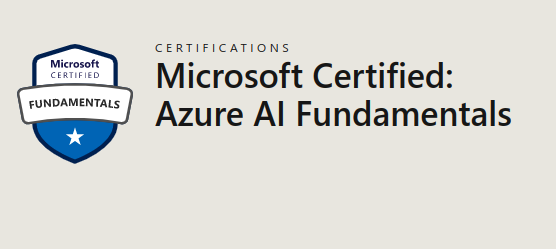
Microsoft Certified Azure AI Fundamentals
Best for AI concepts on Azure services
The Microsoft Certified Azure AI Fundamentals certification is designed to help you master the basics in Azure AI. It will demonstrate your knowledge of common AI and ML workloads and how Azure services can assist with them. It is recommended to have some general programming knowledge or experience, but it is not required.
You can use Azure AI Fundamentals to reinforce your basics for other Azure role-based certifications, like Azure Data Scientist Associate, Azure AI Engineer Associate, or Azure Developer Associate, but it’s not a prerequisite for any of them.
Experience Required
- No specific prerequisites.
- Basic understanding of AI concepts and Azure services is helpful but not required.
Course Content
With such a rapidly evolving field as AI, Microsoft periodically updates the course content to reflect the skills required. Below is a summary of the current course content:
- Introduction to AI Concepts
- Overview of AI
- Understanding ML
- Basics of deep learning and neural networks
- Natural language processing (NLP)
- Computer vision and image analysis
- Azure AI Services
- Azure Cognitive Services
- Vision services
- Speech services
- Language services
- Decision services
- Azure Bot Service
- Building, testing, and deploying bots
- Integrating bots with various channels
- Azure Cognitive Services
- AI Workloads and Considerations
- Identifying AI workloads
- Determining the appropriate AI service
- Data privacy and security in AI solutions
- Responsible AI and ethical considerations
- Building AI Solutions with Azure
- Azure Machine Learning service
- Creating and managing workspaces
- Developing ML models
- Deploying and managing models
- Azure Databricks
- Introduction to Databricks
- Using Databricks for data processing and ML tasks
- Azure Machine Learning service
- Case Studies and Real-World Applications
- Practical examples of AI solutions in various industries
- Integration of AI services in different scenarios
- Best practices for implementing AI solutions with Azure
Feature Chart
| Duration | 10 -12 hours |
| Study Format | Self-paced online learning or instructor-led option |
| Exam Format | Online proctored |
| Assessment Type | Multiple-choice and scenario-based questions |
| Study Resources | Microsoft Learn AI-900 Study Guide: Official Exam Reference Book |
| Course Fee | Free (Microsoft Learn) |
| Certificate Fee | $99 (Exam Fee) |
| Certification Expiry Period | Not applicable |
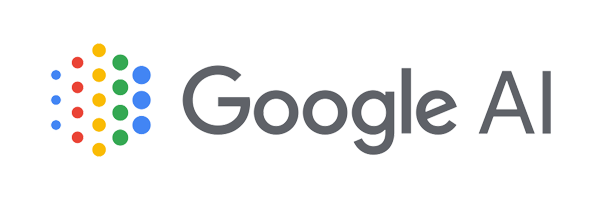
Learn with Google AI
Best for hands-on learning with Google’s AI tools
Google’s AI education portal is a great place to start learning AI. This free course will teach you the basics of AI and ML, including how to build models, make predictions, and improve your results.
You’ll also find tips and assignments to help you master your abilities and advance your projects if you’re a seasoned ML expert.
The portal has filters that allow you to specify your professional field, for example, data researcher, software engineer, business decision-maker, student, and so on. You can also select the type of study content you’re interested in and your stage of ML development.
Experience Required
- No specific prerequisites.
- Familiarity with basic programming concepts is recommended.
- Some experience with Python is helpful but not required.
Course Content
As mentioned above, the portal has a filter that allows you to specify your professional field and the type of content you’re interested in. The course content, therefore, differs depending on your area of study and competence level. For example, one of the videos, The 7 Steps of Machine Learning, walks novices through the basic process of building ML models.
On the other hand, if you’re a software engineer with some AI experience and looking to construct an ML model, you might be interested in the Machine Learning Crash Course with TensorFlow APIs, a more intensive technical course.
Feature Chart
| Duration | Varies |
| Study Format | Self-paced online learning |
| Exam Format | Not applicable |
| Assessment Type | Not applicable |
| Study Resources | Google AI Website, TensorFlow resources, YouTube videos |
| Course Fee | Free |
| Certificate Fee | Not applicable |
| Certification Expiry Period | Not applicable |

Artificial Intelligence A-Z 2023: Build an AI with ChatGPT4 (Udemy)
Best for a comprehensive, hands-on approach
This course is a bestseller on Udemy and is designed for those who want to learn how to build AI applications from scratch.
The course focuses on experiential or “active learning,” where students gain knowledge through practical experience and guided experiments. You’ll learn about the different types of AI algorithms, selecting the right datasets for training models, and deploying AI applications.
The course was recently updated to incorporate ChatGPT4 into the AI building process.
Experience Required
- Basic programming knowledge (preferably in Python).
- Familiarity with high school-level mathematics.
- No prior AI experience required.
Course Content
The course has 5 main sections as shown below comprising a total of 125 lectures:
- Installing Anaconda
- Fundamentals of Reinforcement Learning
- Deep Q-Learning
- Deep Convolutional Q-Learning
- A3C
Feature Chart
| Duration | 17 hours |
| Study Format | Self-paced online learning |
| Exam Format | Not applicable |
| Assessment Type | Quizzes and practical projects |
| Study Resources | Udemy platform, video lectures, project files |
| Course Fee | $139.99 (though it’s often steeply discounted) |
| Certificate Fee | Included in course fee |
| Certification Expiry Period | Not applicable |
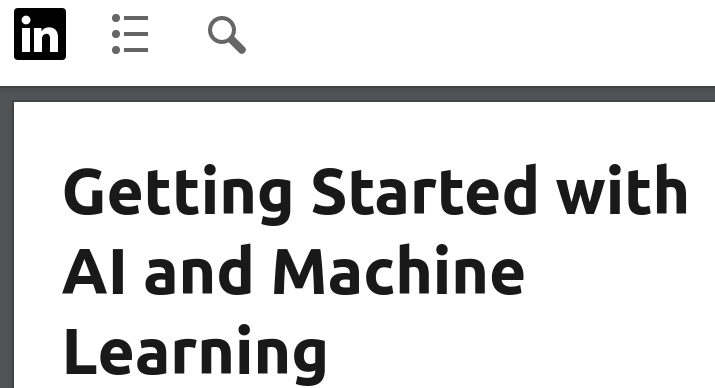
Master the Fundamentals of AI and Machine Learning (LinkedIn Learning)
Best for busy professionals
This LinkedIn course is designed for busy professionals who want to learn the basics of AI and ML. You’ll explore the science behind AI, ML, and cognitive computing. In addition, you’ll discover how major businesses are employing AI and ML to revolutionize their business models and how the next generation of thinking about AI is addressing accountability, security, and explainability concerns.
Experience Required
- No specific prerequisites.
- Basic programming knowledge and understanding of mathematics is helpful.
Course Content
The learning path to attaining the certification includes the following LinkedIn courses.
- Artificial Intelligence Foundations: Thinking Machines
- Machine Learning Foundations: Linear Algebra
- Deep Learning: Getting Started
- Deep Learning Foundations: NLP with TensorFlow
- Computer Vision Deep Dive in Python
- Reinforcement Learning Foundations
- Hands-On PyTorch Machine Learning
Feature Chart
| Duration | 9 hours 27 minutes |
| Study Format | Self-paced online learning |
| Exam Format | Not applicable |
| Assessment Type | Quizzes |
| Study Resources | LinkedIn Learning platform, video lectures, exercise files |
| Course Fee | Included with LinkedIn Learning subscription ($39.99/mo., or $19.99/mo. billed annually) |
| Certificate Fee | Included in subscription |
| Certification Expiry Period | Not applicable |
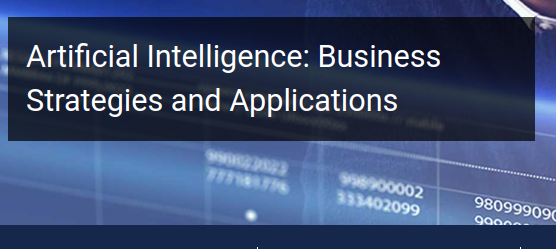
Artificial Intelligence: Business Strategies and Applications (UC Berkeley)
Best for business integration
This course by UC Berkeley is targeted at senior business leaders, including C-suite executives, who plan to implement AI in their business strategy. It’s also helpful for data scientists, analysts, and functional business heads interested in exploring how AI can improve business intelligence and analytics.
The course is designed as an AI primer focusing on AI applications in business rather than the technology itself. Therefore, it requires no technical prerequisites.
Experience Required
- No specific prerequisites.
- Some knowledge of business and management concepts is beneficial.
- Basic understanding of AI technologies and their applications is helpful.
Course Content
The course has eight modules as follows:
- Introduction—AI and Business
- Machine Learning Basics
- Neural Networks and Deep Learning
- Key Applications: Computer Vision and NLP
- Robotics
- AI Strategy
- AI and Organizations: Building Your AI Team
- The Future of AI in Business
Feature Chart
| Duration | 2 months (instructor-led) |
| Study Format | Instructor-led online learning |
| Exam Format | Not applicable. Participants must complete a set of required activities |
| Assessment Type | Assignments and group projects |
| Study Resources | UC Berkeley platform, video lectures, readings, case studies |
| Course Fee | $2,800 |
| Certificate Fee | Included in course fee |
| Certification Expiry Period | Not applicable |
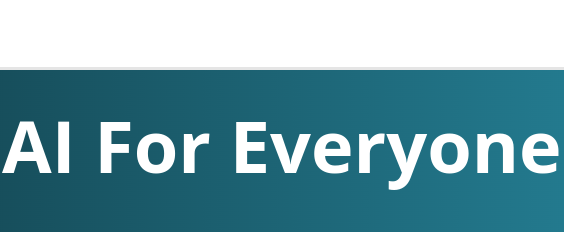
AI for Everyone (Coursera)
Best for non-technical professionals
This AI course on Coursera is designed for non-technical business professionals such as product managers, marketing managers, and startup founders. The course is taught by Andrew Ng, founder of DeepLearning.Ai, co-founder of Coursera, and an AI expert.
The course aims to help you understand AI’s key concepts, applications, and ethical implications. By the end of the course, you should be able to identify potential areas where AI can significantly impact your business.
Experience Required
- No specific prerequisites.
- Suitable for non-technical individuals or those with a limited technical background.
Course Content
The course has 4 sections:
- What is AI?
- Building AI Projects
- Building AI In Your Company
- AI and Society
Feature Chart
| Duration | 10 hours |
| Study Format | Self-paced online learning |
| Exam Format | Not applicable |
| Assessment Type | Quizzes and peer-reviewed assignments |
| Study Resources | Coursera platform, video lectures, readings |
| Course Fee | Free (audit), or included with Coursera subscription |
| Certificate Fee | Included in subscription, or $49 for individual course purchase |
| Certification Expiry Period | Not applicable |

Introduction to TensorFlow for Artificial Intelligence, Machine Learning, and Deep Learning (Coursera)
Best for TensorFlow mastery
TensorFlow is a popular open-source AI library for dataflow programming used in research and production by major companies such as Google, Facebook, IBM, and Netflix.
This course is available on Coursera and is designed to teach software engineers how to use TensorFlow to implement machine learning and deep learning algorithms. The course uses a hands-on approach and requires some Python programming experience.
Experience Required
- Basic programming knowledge (preferably in Python).
- Familiarity with high school level mathematics.
- No prior AI or TensorFlow experience required.
Course Content
The course has four modules:
- A New Programming Paradigm
- Introduction to Computer Vision
- Enhancing Vision with Convolutional Neural Networks
- Using Real-World Images
Feature Chart
| Duration | 17 hours |
| Study Format | Self-paced online learning |
| Exam Format | Not applicable |
| Assessment Type | Quizzes and programming assignments |
| Study Resources | Coursera platform, video lectures, readings |
| Course Fee | Free (audit), or included with Coursera subscription |
| Certificate Fee | Included in subscription, or $49 for individual course purchase |
| Certification Expiry Period | Not applicable |
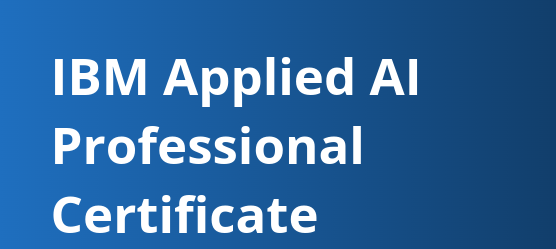
IBM Applied AI Professional Certificate (Coursera)
Best for a well-rounded AI education
This AI certification program from Coursera and IBM is designed for software developers, data scientists, and AI engineers who want to apply AI to business problems.
The topics covered in this Professional Certificate will equip you with the skills and knowledge you need to write smart applications using existing AI services and APIs, with little to no coding required. You’ll learn about ML, NLP, image classification, data science, image processing, APIs, OpenCV, and IBM Watson AI services.
The courses will also teach you to incorporate predeveloped AI knowledge into your products and solutions. By the end of the IBM Applied AI Professional Certificate, you will have developed several projects demonstrating your ability to apply AI and create AI-powered solutions. This Professional Certificate is a great way to learn the basics of AI and develop the skills you need to create your own AI-powered applications.
In addition to obtaining an AI Professional Certificate from Coursera, you’ll get an IBM digital badge proving your expertise in applied AI. The course even earns you credits towards a Bachelor of Science in Computer Science degree at the University of London.
Experience Required
- No specific prerequisites.
- Basic programming knowledge and understanding of mathematics is helpful.
- Some experience with Python is beneficial but not required.
Course Content
The course has six modules:
- Introduction to Artificial Intelligence (AI)
- Getting Started with AI using IBM Watson
- Building AI-Powered Chatbots Without Programming
- Python for Data Science, AI and Development
- Python Project for AI and Application Development
- Building AI Applications with Watson APIs
Feature Chart
| Duration | 6 months (3 hours per week) |
| Study Format | Self-paced online learning |
| Exam Format | Not applicable |
| Assessment Type | Quizzes, peer-reviewed assignments, and hands-on projects |
| Study Resources | Coursera platform, video lectures, readings, practice exercises |
| Course Fee | Free (audit), or included with Coursera subscription |
| Certificate Fee | Included in subscription, or $39/month for individual course purchase |
| Certification Expiry Period | Not applicable |
What are the benefits of AI certifications and courses?
AI certifications offer a structured approach to acquiring the necessary skills and knowledge for working in the rapidly evolving field of AI. Pursuing a certification course can lead to personal growth, career advancement, and increased credibility in the industry.
They help you hone your skills and improve your career prospects, and they provide access to industry-recognized resources and networking opportunities.
Hone your skills in a structured manner
AI certifications provide a well-organized and structured curriculum designed by experts in the field. This allows students to systematically learn the key concepts, methodologies, and techniques required to excel in AI-related roles.
By following a guided learning path, you can have the peace of mind of knowing you are gaining a comprehensive understanding of the subject matter while also building on your prior knowledge and skills.
Improve your marketability and job prospects
As the demand for AI professionals grows, having a recognized certification on your resume can make you stand out from the competition.
Employers often view certifications as evidence of your dedication and commitment to the field, as well as your ability to apply AI concepts in real-world scenarios. By obtaining a certification, you can demonstrate your expertise and increase your chances of securing a rewarding job in the industry.
Access to industry-recognized study resources
AI certification courses provide students access to high-quality study materials, often developed by leading organizations in the field. These resources, including video lectures, reading materials, and hands-on exercises, are designed to help students gain a solid understanding of AI concepts and practices.
By learning from industry-recognized resources, students can be assured they are acquiring knowledge that is both relevant and up-to-date.
Networking opportunities
Many AI certification courses offer networking opportunities with fellow students, instructors, and industry professionals. These connections can prove invaluable for career growth, as they can lead to job referrals, collaboration opportunities, and the sharing of insights and best practices.
By enrolling in a certification course, students can expand their professional network and increase their visibility within the AI community.
Flexible learning options
AI certification courses often provide flexible learning options, such as self-paced learning or instructor-led sessions, allowing you to choose the best format for your needs and schedule.
Besides, most courses are offered online, enabling students to learn from anywhere and at their own pace. This flexibility makes it easier for working professionals, students, or individuals with other commitments to enhance their AI skills and knowledge while balancing other aspects of their lives.
Is an AI certification worth it?
With so many people competing for jobs in the tech industry, anything that can give you a leg up is worth considering. An AI certification can help you stand out from the crowd and show potential employers you have the skills and knowledge to work with this cutting-edge technology.
An AI certification can also help you keep up with the latest advancements in this rapidly changing field and help ensure you are always up-to-date on the latest trends and best practices.
As businesses become more reliant on AI technology, there will be an increasing demand for workers with expertise in this area. Pursuing certification can position you to take advantage of these new opportunities.
How to choose the best AI certification for you
Choosing the best AI certification isn’t always a straightforward process; it depends on your unique needs and objectives. To help you make that decision, here are some pivotal factors to consider:
Define your use case
People are leveraging AI for various purposes running the gamut from data analytics and automation to customer service and product optimization. A clear definition of your use case helps you find certifications that contain relevant modules and practical exercises. It also helps you find industry relevant certifications tailored to your sector.
Assess your technical proficiency
Certifications range from beginner to advanced levels. Choosing one that matches your proficiency will greatly enhance your learning experience and ensure you don’t end up over your head in unfamiliar jargon, or on the other hand, wasting time with background you already know.
Understand the time commitment
If you’re a busy professional, it is best to sign up for courses that offer self-paced online learning. This allows you to juggle work and other responsibilities.
Factor in your budget
There are many free options for AI courses, but most will require a financial investment to receive a certificate as proof of completion. You’ll have to determine for yourself how much you are willing and able to spend on that.
Consider certificate recognition
Finally, if you really want to make an impact on your resume, choose a certification from a prestigious institution or a reputable platform to make sure your time and financial investment goes furthest toward advancing your professional goals.
Top industries using AI today
Due to its potential to vastly improve the operations of organizations across nearly all economic sectors, AI is seeing widespread adoption. Below is a summary of some of the top industries using AI today:
- Finance and banking: It comes as no surprise that the finance sector is a frontrunner in the uptake of AI. AI tools analyze vast amounts of data in real-time, helping with risk assessment, fraud reduction, and customer service.
- Healthcare: The field of healthcare is experiencing a revolution due to the use of AI. It is transforming how diagnoses are made, treatment plans are created, and patient care is provided. From analytics for disease detection to visual precision for performing robotic surgeries, AI innovation is thriving in the healthcare sector.
- Retail and e-commerce: AI plays a role in personalizing customer experiences. Whether it’s chatbots responding to customer inquiries or AI algorithms predicting shopping behavior, this technology is reshaping the way we shop and interact with retailers.
- Automotive: When it comes to AI applications in automotive, self-driving cars often steal the spotlight. However, AI also finds its place in areas such as maintenance, manufacturing processes, and customer service within the industry.
- Energy: The energy and utilities sector benefits from AI by optimizing energy consumption and predicting equipment failures. Smart grids driven by AI algorithms can dynamically adjust energy distribution to enhance sustainability efforts.
- Media and entertainment: In the realm of media and entertainment content recommendation engines represent a fraction of what AI can do. Now we see AI algorithms contributing to content creation, conducting audience analysis, and even automating video editing processes.
- Manufacturing: Manufacturing has embraced AI for purposes like maintenance practices, quality control measures, and optimizing supply chains. The rise of smart factories stands as evidence of how AI has come into play within this sector.
- Agriculture: Thanks to AI, precision agriculture is transforming farming methods. It allows farmers to maximize irrigation efficiency, identify plant diseases, and even forecast crop yields.
How we evaluated the top AI courses and certifications
In order to identify the top AI certifications for this article, we employed a thorough and impartial research methodology.
We aimed to ensure that the selected courses provide high-quality learning experiences, are widely recognized within the industry, and offer evergreen certifications that do not expire.
The following factors were considered during our selection process:
Provider reputation
We prioritized courses provided either by leaders in the AI industry, such as Microsoft and Google, or well-established online education providers such as LinkedIn, Udemy, and Coursera. These organizations’ reputations bolster the credibility of their courses and ensure their certifications will stand out in your resume.
Independent third-party reviews
We consulted multiple sources of information, including independent third-party reviews from reputable websites, publications, and online forums. These reviews provided insights into the experiences of other students and experts, helping us gauge the overall quality and effectiveness of each course. We also considered the course’s ratings, the number of students who have taken the course, and the feedback from professionals within the AI industry.
Speaking directly to past students
To gain first-hand knowledge of the courses, we reached out to past students and sought their feedback on the learning experience, course content, and the impact of the certification on their career prospects. This allowed us to gather valuable information about the real-world outcomes of each course and assess their relevance to the needs of AI professionals.
Evergreen certifications
One of the key criteria in our selection process was to focus on courses that offer certifications that do not expire. This ensures that once students complete the course and earn their certification, it remains valid indefinitely, allowing them to showcase their expertise in AI without the need for periodic renewal.
That said, we must emphasize that even though we choose evergreen certifications, the onus is on the student to continuously keep up to date with developments in this space and to pursue continuing education relentlessly.
Bottom line: Getting ahead with an AI certification
An AI certification will allow you to master fundamental concepts of ML and deep learning. In addition, you’ll be able to use programming languages like Python to solve industry problems involving predictive modeling, NLP, computer vision, image and video processing, and reinforcement learning.
You’ll also learn to work with AI libraries like ScikitLearn, Pandas, and SciPy and platforms like TensorFlow, Keras, and PyTorch. In addition, you’ll gain an understanding of AI’s ethical and legal issues.
With an AI certification, you’ll be prepared for various AI-related careers such as data science, ML engineering, software engineering, research science, and business intelligence.
It’s no secret that AI is appearing everywhere in today’s technology world. Dive deeper into its various applications with our guides:


